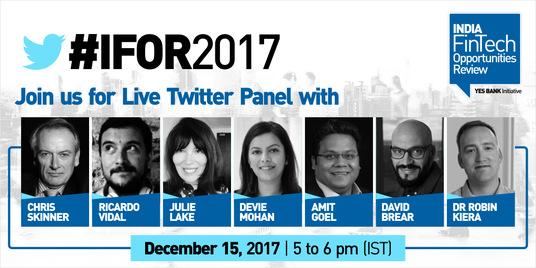A few weeks ago, I had the honor to participate in a live Twitter panel with role models such as David Brear and Chris Skinner – it was fantastic to participate with them – as well as Ricardo Vidal of Kreditech, Julie Lake of FinTechCity and Devie Mohan.
This Twitter panel was formatted as a Q&A session, moderated by industry thought leader and LTP and MEDICI Founder Amit Goel. He was the one who started the conversation.
Provoking Questions
The chat itself was a bit of a whirlwind. Amit posed some great thought-provoking questions, many of which centered on the development of FinTech ecosystem both within and outside of India. He asked Chris Skinner about the essential elements of enabling FinTech ecosystem (who listed government and regulator commitment, tax incentives for startups, and a good local talent pool), and Devie Mohan about what is needed in an ecosystem to support FinTechs (multidisciplinary skills, regulatory support like sandboxes, and access to capital). For India, Amit asked Devie questions about what an ecosystem can provide to encourage Global FinTechs to enter the Indian market and David what pain points Fintechs can address in an emerging economy like India. Devie Mohan underlined the opportunity for local partnerships and David pointed out p2p mobile payments as one solution Fintech can offer
Talking with not about each other
A lot of these questions sparked some interesting conversations – For example, Amit asked me, “Which technologies should a regulatory sandbox focus on in an emerging market like India?” My response was that, in such a fast-paced environment, it might be wiser to set up a regulatory sandbox that does not limit itself by defining rules to certain existing technologies. David echoed this sentiment in a warning reply against using certain technologies “just because.” This sparked some good points about understanding what the specific problems are in each developing ecosystem (and industry!) and looking at other industries for solutions ideas. Only then, in David’s words, can we “understand the technological rationale.”
To read these conversations and reach the entire chat event, you can search for the hashtag #IFOR2017 on Twitter and sort by latest, going down to December 15th.
I was really honored to be a part of this session as a member of the advisory council of the India Fintch Opportunities Review and to chat with some of my personal heros and experts from all around the world, participating in interesting discussions about the future of the FinTech industry.
Twitter as tool to share knowledge
Twitter as a platform was a great idea and really fun to use for this format. One of the great things about social media in general is it allows the public to tune in and participate in events like this one. It encourages one of my favorite things: The international sharing of perspectives on a growing field – FinTech – wrapped in a fun, engaging format and designed to really get the cogs going when it comes to innovation and development.
Note:
As I shared earlier on this blog, the Yes Bank is India’s fifth largest private sector bank supporting the country’s national goal to “Make India Digital.” Yes Bank’s Fintech initiative is planned to serve as a platform for collaboration between Yes Bank and Fintech startups to create innovative solutions for the bank’s 2+ million customers in 20 markets.








